Related Research Articles

Cosmic Encounter is a science fiction–themed strategy board game designed by "Future Pastimes" and originally published by Eon Games in 1977. In it, each player takes the role of a particular alien species, each with a unique power to bend or break one of the rules of the game, trying to establish control over the universe. The game was inducted into the Academy of Adventure Gaming Arts & Design Adventure Gaming Hall of Fame in 1997.
Battlestar Galactica is an American science fiction franchise. It may also refer to the following aspects of the franchise:

Call of Cthulhu: The Card Game is an out-of-print card game produced and marketed by Fantasy Flight Games. It is based on Chaosium's Call of Cthulhu role-playing game, the writings of H. P. Lovecraft, and other Cthulhu Mythos fiction. In 2008, Fantasy Flight moved the game over to its Living Card Game (LCG) format, which retains the deck-building aspect of collectible card games, but without the random distribution.
A Game of Thrones is a strategy board game created by Christian T. Petersen and published by Fantasy Flight Games in 2003. The game is based on the A Song of Ice and Fire series of high fantasy novels by George R. R. Martin. It was followed in 2004 by the expansion A Clash of Kings, and in 2006 by the expansion A Storm of Swords.
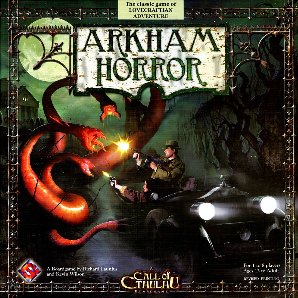
Arkham Horror is a cooperative adventure board game designed by Richard Launius, originally published in 1987 by Chaosium. The game is based on Chaosium's roleplaying game Call of Cthulhu, which is set in the Cthulhu mythos of H.P. Lovecraft and other horror writers. The game's second edition was released by Fantasy Flight Games in 2005, with a third edition in 2018.
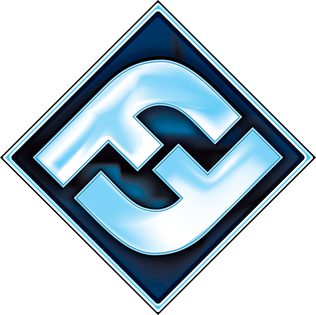
Fantasy Flight Games (FFG) is a game developer based in Roseville, Minnesota, United States, that creates and publishes role-playing, board, card, and dice games. As of 2014, it is a division of Asmodee North America.
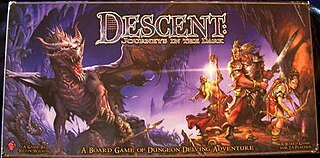
Descent: Journeys in the Dark is a two to five player high fantasy dungeon crawl published by Fantasy Flight Games in 2005. Descent was designed and produced by Kevin Wilson. The game is based on an improved version of the mechanics of FFG's licensed Doom: The Boardgame. In Descent, players take the roles of adventurers who delve into underground complexes in search of treasure. One player takes the role of the Overlord, who controls the enemies and plays cards to hinder the hero players. Descent differs from other games in the genre in that the Overlord player's goal is to win by exhausting the other players of victory points, rather than merely to facilitate play. The Overlord's resources are limited by the rules of the game, which require them to hoard and expend "threat" points, which are generated in response to the hero players' actions, in order to hamper the other players and to bring out additional monsters to defeat them. This mechanism is very much reminiscent of The Lord of the Rings when playing with the Sauron optional expansion.
StarCraft: The Board Game, published by Fantasy Flight Games, is a game inspired by the 1998 computer game StarCraft. Players take control of the three distinctive races featured in the video games, the Terrans, the Protoss, or the Zerg, to engage in battle across multiple worlds in order to achieve victory. Each of the three races features a fairly different playing style. A prototype of the game was shown in BlizzCon 2007, with pre-release copies sold at Gen Con 2007 and Penny Arcade Expo 2007. It was publicly released in October 2007.
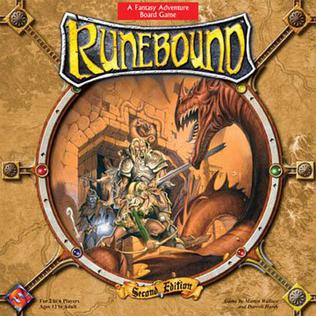
Runebound is a high fantasy adventure board game created by Martin Wallace and Darrel Hardy and published by Fantasy Flight Games in 2004. A second edition was published in 2005. A third edition was released in 2015. In Runebound, one to six players take the roles of adventurers who seek out quests. The quests are then resolved with either victory for the player, or a loss of some item. Each player is seeking quests and trying to gain experience which results in greater power and combat skill.

Battlestar Galactica Collectible Card Game is an out-of-print collectible card game based on the Battlestar Galactica science fiction media franchise. The game, published by WizKids, saw first release in May 2006 and was officially canceled in March 2007.
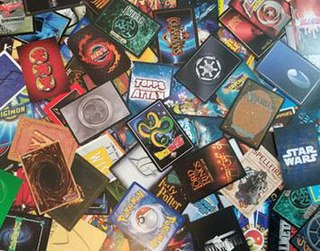
A collectible card game (CCG), also called a trading card game (TCG) among other names, is a type of card game that mixes strategic deck building elements with features of trading cards. It was introduced with Magic: The Gathering in 1993.
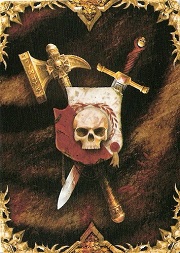
Warhammer: Invasion is a Living Card Game (LCG) designed by Eric M. Lang and produced by Fantasy Flight Games in 2009, set in the Warhammer Fantasy universe. Like Fantasy Flight's other LCGs, Invasion is sold as a core set, which can be played on its own, or built upon with expansion packs. Each pack has a fixed set of 3 copies each of 20 cards. There are six factions in Invasion: Dwarves, Empire, Orcs, Chaos, High Elves, and Dark Elves. The first four have decks in the core set, while the elves' decks are available in the Assault on Ulthuan expansion.
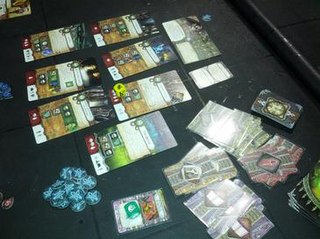
Elder Sign is a cooperative card and dice game, based on the Cthulhu Mythos of horror writer H.P. Lovecraft and Chaosium's Call of Cthulhu roleplaying game. It is published by Fantasy Flight Games, which also produces the Cthulhu Mythos games Arkham Horror, Call of Cthulhu: The Card Game, Mansions of Madness, and Eldritch Horror.

Mansions of Madness is a tabletop strategy game designed by Corey Konieczka and published by Fantasy Flight Games in 2011. Players explore a locale filled with Lovecraftian horrors and solve a mystery.
A deck-building game is a card game or board game where construction of a deck of cards is a main element of gameplay. Deck-building games are similar to collectible card games (CCGs) in that each player has their own deck. However, unlike CCGs, the cards are not sold in randomized packs, and the majority of the deck is built during the game, instead of before the game.

The Lord of the Rings: The Card Game is a non-collectible customizable card game produced by Fantasy Flight Games. As part of the Living Card Game (LCG) genre, it is a cooperative and strategic card game set in Middle-earth, a fantasy world featured in literary works by J. R. R. Tolkien, including The Hobbit and The Lord of the Rings. Its digital adaptation, titled The Lord of the Rings: Adventure Card Game, is published by Asmodee Digital for cross-platform play on Microsoft Windows, macOS, PlayStation 4, Xbox One and Nintendo Switch, being the "first ever digital LCG".

Battlestar Galactica: The Board Game is a board game created by Corey Konieczka and first published by Fantasy Flight Games in 2008 based on the 2004 Battlestar Galactica series. Players take the roles of characters from the series, trying to guide the Galactica and its fleet to its destination, while combating the Cylons and other crises threatening it. One or more players are secretly enemy Cylons, who win if the humans fail to achieve their objective.
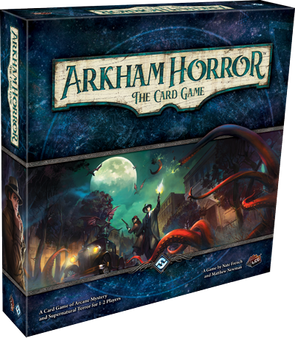
Arkham Horror: The Card Game is a cooperative living card game produced by Fantasy Flight Games. It is set in the universe of Chaosium's Call of Cthulhu roleplaying game which is itself based on the Cthulhu Mythos of H. P. Lovecraft and other cosmic horror writers. The title refers to Lovecraft's fictional town of Arkham, Massachusetts which is mentioned in many Mythos stories.

Star Wars: Rebellion is an asymmetrical strategy board game designed by Corey Konieczka and published by Fantasy Flight Games in 2016. The game's setting is inspired by the original Star Wars trilogy. Players control either the Galactic Empire or the Rebel Alliance. Each player pursues a different path to victory, with the Galactic Empire playing seeking to find the Rebel Alliance player's base and destroy it, while the Rebel Alliance player attempts to avoid detection by the Galactic Empire and sabotage their efforts. The game received highly positive reviews and won numerous awards.
References
- 1 2 Hall, Charlie (2021-11-05). "Unfathomable revives an excellent board game lost to licensing hell". Polygon . Retrieved 2024-07-05.
- 1 2 Nelson, Samantha (2021-12-06). "Unfathomable board game review". Dicebreaker . Retrieved 2024-07-04.
- ↑ Dohm-Sanchez, Jeffrey (2021-06-11). "Take a Terrifying Voyage on the Atlantic in 'Unfathomable'". ICv2 . Retrieved 2024-07-04.
- ↑ Dohm-Sanchez, Jeffrey (2024-03-08). "Fantasy Flight Games Announces New 'Unfathomable' Expansion". ICv2 . Retrieved 2024-07-05.
- 1 2 3 "Unfathomable: Learn to Play" (PDF). Fantasy Flight Games . Archived (PDF) from the original on 2024-06-16. Retrieved 2024-07-04.
- 1 2 Adler, Matthew (2021-12-16). "Unfathomable Review". IGN . Retrieved 2024-07-04.
- 1 2 Kainulainen, Veeti (2021-11-22). "Unfathomable -lautapelin arvostelu". Lautapeliopas (in Finnish). Retrieved 2024-07-04.
- ↑ Pettit, Charlie (2022-01-02). "Unfathomable Review". Tabletop Gaming Magazine. Retrieved 2024-07-04.